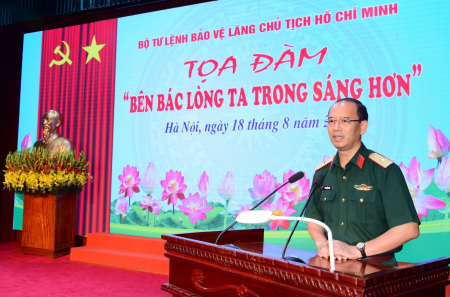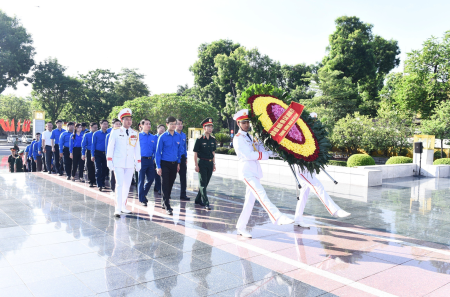Ho Chi Minh Mausoleum Guard Command promotes the emulation of virtues and expertise cultivation
Honoured with the mission to preserve President Ho Chi Minh’s remains in the long term with absolute safety and promote the political significance of the Mausoleum, the cadres and soldiers of Ho Chi Minh Mausoleum Guard Command are consistently striving to cultivate virtues and expertise to excellently fulfiling their sacred duties, worthy of the pride and immense responsibility entrusted by the Party, State, People, and the Army.
The Party Committee of Unit 969, Ho Chi Minh Mausoleum Guard Command, deeply understand that the outstanding accomplishment of the mission to “preserve President Ho Chi Minh’s remains in the long term with absolute safety and promote the political significance of the Mausoleum in the new period” is not only for educating and propagating the values of President Ho Chi Minh’s life, status, career, thoughts, ethics, and style to the people, soldiers, and international friends but also to thwart any destructive schemes of hostile forces, contributing to safeguarding the ideological foundation of the Party and the socialist Vietnam. To meet this demand and mission, one of the central focuses of the Party Committee of Unit 969 is to lead and direct the thriving emulation of cultivating virtues and expertise continuously.
 |
| Maj. Gen. Dinh Quoc Hung addresses at a seminar on following Uncle Ho's virtues |
To ensure a unified understanding for implementation, the Party Committee of Unit 969 focuses on leading and directing various agencies and units to carry out political education and ideological orientation effectively. During the implementation, along with the vigorous deployment of the “Renewal of political education at the unit in the new period”, Party committees, commissars, political cadres, commanders, and political agencies at all levels set specific goals and content for education closely aligned with their respective tasks. The focuses are on educating about the traditions and qualities of “Uncle Ho’s Soldiers” in the new era and tradition, pride, and honour of the “Soldiers of Uncle Ho” at His Mausoleum; instilling a sense of loyalty and high responsibility in fulfiling tasks; and identifying and combating incorrect hostile viewpoints to firmly protect the ideological foundation of the Party. To achieve effectiveness, the subordinates actively innovate the forms and methods of education: Combining regular education with specialised and thematic education; utilising meeting, learning, and task assignment activities; holding forums, discussions, exchanges, and youth propagandists’ competitions, etc., to clarify the purpose, significance, content, and appropriate methods of cultivating virtues and enhancing talents that are in line with the functions, tasks, and characteristics of each target group. Through these efforts, a significant transformation in the perception and actions of cadres and soldiers within the entire unit has been achieved, making the cultivation of virtues and expertise in line with Ho Chi Minh’s thoughts, ethics, and style a voluntary and regular practice.
In order to guide cadres and soldiers in their pursuit of self-cultivation and skill enhancement, organisations and units have concretised criteria closely related to their assigned functions and tasks. For example, they have specifically detailed the standards of “Uncle Ho’s Soldiers” into criteria for political, ideological, and moral qualities, ethics, and lifestyle of cadres and soldiers working at Ho Chi Minh Mausoleum Guard Command; discipline, meticulousness, carefulness, accuracy, and absolute safety in medical and technical assurance tasks; consciousness of vigilance, steadfastness, proficient competence, and sharpness in ensuring security and combat readiness; discipline, regulation, and strength in performing military ceremonies and manners; and carefulness, attentiveness, courtesy, and politeness in welcoming and propagandising, etc. These criteria are closely integrated into all activities of the units, especially in the implementation of rules and regulations: Learning, living, discipline, and office culture; building clean and strong Party organisations, comprehensively strong, “exemplary and typical” units; the emulation movement of “Youth of the Armed Forces cultivating virtues and expertise, taking initiative, being creative, and be determined to win”, etc. In order to motivate cadres and soldiers to cultivate their virtues and expertise, agencies and units have implemented many effective models and methods, such as the three role models of “Thinking, Speaking, and Acting” based on the standards of “Uncle Ho’s Soldiers” in the new era or “The superiors model for the subordinates to follow”; orientations of “Loyalty, Creativity, Dedication, and Attentiveness”; “Striving to learn, make efforts to cultivate, and unceasingly following Ho Chi Minh’s thoughts, ethics, and style,” etc. In the process of implementation, organisations and units have regularly reviewed, adjusted, and supplemented the content and criteria for cultivating virtues and expertise to be closely related to the assigned tasks and duties of cadres, Party members, employees, soldiers, workers, and of organisations, agencies, and units.
 |
| Serving guest's visit to the Mausoleum |
Enhancing the role of the Party committees, Party organisations, and leading cadres at all levels, as identified by Party Committee 969 is a crucial solution in leading and directing the movement for cultivating virtues and enhancing talents as the Party committees, Party organisations, and leading cadres are the direct leaders, directors, and organisers of implementing the content, forms, and methods of cultivating virtues and expertise for the cadres and soldiers. This is an ongoing, long-term task included in the regular leadership resolutions of the Party organisations at all levels and specifically implemented in the work plans of the leading cadres at agencies and units. In the implementation process, leaders and commanders at all levels have prioritised assigning tasks and clearly defining content, criteria, and timelines for each cadre and soldier to strive for and emphasised the content of cultivating virtues and expertise based on the Ho Chi Minh’s thoughts, ethics, and style. In this regard, implementation has been done meticulously with clear assignments and responsibilities to promote the senses of responsibility and role modelling of the Party committees, secretaries, deputy secretaries, and Party members in cultivating virtues and expertise following the spirit of the “seven dares” to inspire the masses. In each position and responsibility, the cadres in charge at all levels have consistently emphasised personal responsibility; been proactive in research, exchange, and unification of issues that need to be carried out in various forms of education and training for the soldiers; and paid attention to building a “Cultural Unit” and “Cultural Environment,” creating favourable conditions for cultivation among cadres and soldiers. At the same time, they have conducted effective supervision and monitoring to promptly rectify weaknesses and shortcomings in the implementation and firmly fight against any signs of laziness or poor performance in the movement of cultivation within the units.
Furthermore, the Party Committee of Unit 969 has guided agencies and units to prioritise the successful construction and replication of advanced models and vigorously promote emulation and commendation work. Through this, they have discovered good models and best practices for replication; rewarded the right people for the right deeds and actively encouraged the spirit of “good people, good deeds,” to create a strong spillover effect, motivating cadres and soldiers to cultivate in practice; maintain and promote the good qualities of revolutionary soldiers and soldiers at the Ho Chi Minh Mausoleum, who are “Loyal, united, self-reliant, proactive, and creative” and always dedicated to their tasks and units.
Through appropriate, specific, and practical solutions that have been carried out systematically in leadership and guidance, a sense of responsibility, positive spirit, and proactive self-improvement among the cadres and soldiers of Ho Chi Minh Mausoleum Guard Command have become a revolutionary movement with a powerful and impactful spillover effect, delivering tangible and practical results. In particular, the dedicated commitment to cultivating virtues and expertise based on the Ho Chi Minh’ thoughts, ethics, and style has become a goal and driving force, creating a strong spiritual strength for each agency, unit, and individual, contributing to the successful completion of all assigned tasks. Notable achievements include: 100% of cadres and staff who are proficient in basic communication skills in foreign languages for reception and propaganda work with foreign visitors; precise and orderly execution of commands, ensuring “accuracy, uniformity, strength, beauty, and formality”, making the unit exemplary in command and ceremony within the entire armed forces; firm and comprehensive mastership in the medical tasks; and “attentive, considerate, civilised, and polite” reception and service work, ensuring absolute security for thousands of state-level visits and those of state leaders and major events at Ho Chi Minh Mausoleum and K9 Area. Each cadre, staff member, soldier, and worker has truly served as a model of “Uncle Ho’s Soldier” and propagandist and reporter to inform domestic and international friends about the great revolutionary career of President Ho Chi Minh, his thoughts, ethics, and style; and the political and cultural significance of the Mausoleum. The effectiveness of the movement for cultivating virtues and enhancing talents among cadres and soldiers has contributed to building a strong Party Committee of Unit 969 in political, ideological, ethical, organisational, and personnel terms; leading the building of a unit exemplary and typical in commands and ceremonies throughout the entire army; and excelling in the mission to “preserve President Ho Chi Minh’s remains in the long term with absolute safety” and promote the cultural value of the Mausoleum.
Cultivating virtues and experise based on the Ho Chi Minh’s thoughts, ethics, and style within the entire Army, especially at the Ho Chi Minh Mausoleum Guard Command, has become a significant driving force, creating a strong spillover effect and harnessing comprehensive strength in successfully carrying out special political missions. This is also a vital breakthrough solution to ensure that the cadres and soldiers of the unit continue to improve, strive, and live up to the trust of the Party, the State, the Central Military Commission, Ministry of National Defence, and the guidance of General Phan Van Giang - Member of the Politburo, Deputy Secretary of the Central Military Commission, Minister of National Defence: “Ho Chi Minh Mausoleum Guard Command must uphold the spirit of unity, creativity, self-reliance, and self-strengthening; organise reception and service with attention, consideration, civility, and politeness for both domestic and international visitors coming to pay tribute to Uncle Ho, commemorate the fallen heroes, and visit K9 Area, making the image of the Soldiers protecting President Ho Chi Minh Mausoleum a symbol of strength and discipline of the Vietnam People’s Army - the most exemplary image of “Uncle Ho’s Soldiers” in the new era; and pay regular attention to and take care of the building of strong party committees and organisations at all levels in terms of ideology, politics, organisation, and ethics and comprehensively strong, “exemplary and typical” unit, and pure, strong, and exemplary Unit 969 Party Committee within the Military Party Committee”.
Major General DINH QUOC HUNG, Political Commissar of Ho Chi Minh Mausoleum Guard Command